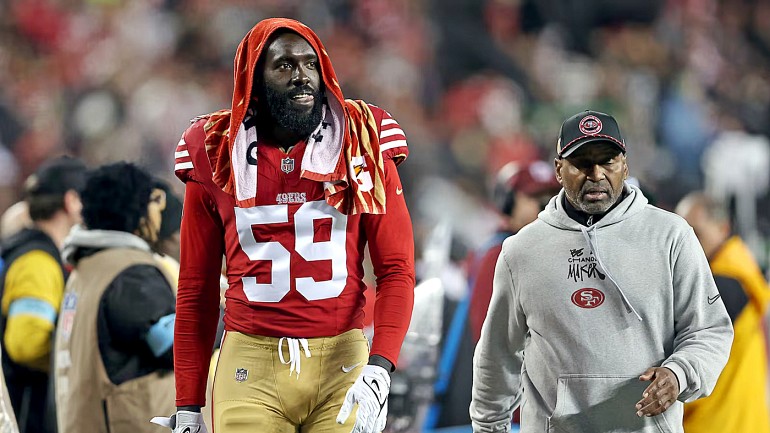Jim Harbaugh undoubtedly wants a winning team, preferably a championship one. During this roster-refresh season, we might more pointedly ask: What kind of personnel does he think will most likely get him those Super Bowl wins?
When Harbaugh assumed head-coaching responsibility prior to the lockout-shortened 2011 off-season, he inherited a team molded by the previous regimes. With the help of a splendid draft, some serious tweaking, and his own coaching staff, Harbaugh led that team to the NFC championship game. With due credit to Harbaugh and his staff, that 2011 squad by and large played the kind of football previous coach Mike Singletary might have preferred: shut-down defense, ball-control offense, and favorable turnover differential, all delivered with a "physical with an F" attitude.
That old-school football, with the Niners' solid execution and the offense's rebooted versions of traditional traps, double teams, and intricate blocking schemes, brought much pleasure to fans, thrilling precisely because of the, to some, improbable success of its throwback style. The 2011 49ers proved that a team could consistently win regular-season games with this old-is-new style. The question became, given today's pass-happy NFL, could a team playing this way consistently win playoff games against elite passing teams? In the playoffs that year, the 49ers beat the Drew Brees Saints but lost to the Eli Manning Giants, admittedly, a small sample size.
What would Harbaugh do, stick with the successful formula of his first season, or tack in a different direction? Midway through the 2012 campaign, despite incumbent QB Alex Smith playing to the top of his capability, and even after Smith regained health, Harbaugh installed the higher-risk-higher-reward Colin Kaepernick as his starting quarterback. With this move, Jim Harbaugh indicated the kind of football he believes can win championships. Alex Smith, according to his new head coach, Andy Reid, can make all the throws necessary for an NFL quarterback. But Colin Kaepernick throws serious heat, and deep down the field. Smith, lest we forget, can make plays with his feet. Kaepernick's already-gone speed shocks defenses.
What does all this have to do with the upcoming NFL draft? Of course, Harbaugh will not have sole say on which players get selected. Trent Baalke and crew will run the draft. But make no mistake, Harbaugh will have strong input, and Baalke knows that teams succeed best when head coaches have the personnel to implement their plans. Joined by need, if not by wish, some fans have dubbed the duo "Harbalk."
Thus, the upcoming draft/free agency moves bear close watching not only for all the usual reasons, but because, given the sheer number of possible picks, and the timing in the careers of both men, these cumulative moves portend the future direction of team Harbalk. Not necessarily the early rounds, where the Niners still might be compelled to draft for need, but, particularly, the mid-and-late-round picks may well answer some crucial questions:
What kind of true depth will the 49ers want on their roster, and where?
At what positions do the 49ers want to spend money?
We now know that both defensive-front Smiths, though injured, still had to play during the late-season/playoff games. Baalke, noted for smokescreens, has said that defensive coordinator Fangio's schemes require playing few players. Really? Or did the 49ers simply misjudge the importance of depth along the defensive line/pass-rush front, and thus, given roster limitations, unintentionally skew their roster/salary-cap emphasis away from that area? Or, conversely, very well aware of this need, especially with a potentially more-quick-striking offense leaving the defense on the field longer, how will they address the defensive front in this year's draft?
Does a potential starting safety hide on the existing roster (factor in both Whitner's age and Goldson's departure), or will the team consider moving, say, Culliver, there? If not the former, the Niners may "shotgun" the safety position, using more than one pick there; if the later, they may emphasize cornerback.
Are the young offensive linemen good enough to step in if a starter gets injured? Will future replacements tend toward pass-blocking prowess or road-grading power?
With Alex Smith gone, what kind of backup quarterback do the Niners prefer, a game manager (possibly Tolzien) or a Kaepernick-lite?
How many tight ends will they consistently use on offense?
Do the 49ers really believe that Jenkins provides the long-term answer as a deep-threat, or will they go back to the wide-out well in the draft? How important might a deep-threat be in a Kaepernick-led offense?
Do the 49ers want a long-term replacement for Frank Gore, or in the future will they opt for a back-by-committee approach?
While bolstering special teams, what other attributes do the 49ers seek in their backups?
Again, the answers to these questions, and others, matter not only in the context of refurbishing the current roster, but will provide clues about the direction that Harbaugh and company want to take the team as they attempt to realize their vision.


